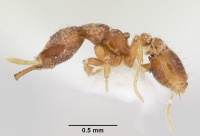Strumigenys conturba
| Strumigenys conturba | |
|---|---|

| |
| Scientific classification | |
| Kingdom: | Animalia |
| Phylum: | Arthropoda |
| Class: | Insecta |
| Order: | Hymenoptera |
| Family: | Formicidae |
| Subfamily: | Myrmicinae |
| Tribe: | Attini |
| Genus: | Strumigenys |
| Species: | S. conturba |
| Binomial name | |
| Strumigenys conturba Bolton, 2000 | |
Nothing is known about the biology of Strumigenys conturba.
Identification
Bolton (2000) – A member of the ebbae complex in the Strumigenys koningsbergeri-group. See Strumigenys ebbae.
Keys including this Species
Distribution
Distribution based on Regional Taxon Lists
Indo-Australian Region: Malaysia (type locality).
Distribution based on AntMaps
Distribution based on AntWeb specimens
Check data from AntWeb
Countries Occupied
| Number of countries occupied by this species based on AntWiki Regional Taxon Lists. In general, fewer countries occupied indicates a narrower range, while more countries indicates a more widespread species. |

|
Estimated Abundance
| Relative abundance based on number of AntMaps records per species (this species within the purple bar). Fewer records (to the left) indicates a less abundant/encountered species while more records (to the right) indicates more abundant/encountered species. |

|
Biology
Castes
Nomenclature
The following information is derived from Barry Bolton's Online Catalogue of the Ants of the World.
- conturba. Strumigenys conturba Bolton, 2000: 841, fig. 454 (w.) WEST MALAYSIA.
Unless otherwise noted the text for the remainder of this section is reported from the publication that includes the original description.
Description
Worker
Holotype. TL 2.1, HL 0.57, HW 0.47, CI 82, ML 0.24, MI 42, SL 0.29, SI 62, PW 0.27, AL 0.55. With characters of ebbae-complex; answering the description of ebbae but differing in relative length of scape and relative width of head, and as follows. On mandible, length of preapical tooth is half or more of the width of the mandible at point where it arises. Inner margin of mandible proximal of preapical tooth shallowly convex. Inner margin of mandible distal of preapical tooth more strongly concave. Outer margin of mandible straight to very shallowly concave in median third of its length. Only extreme tip of eye visible in full-face view. Metapleuron and side of propodeum densely reticulate-punctate. Disc of postpetiole smooth and polished.
Paratypes. TL 2.0-2.1, HL 0.55-0.57, HW 0.46-0.47, CI 82-84, ML 0.24, MI 42-44, SL 0.28-0.29, SI 61-62, PW 0.24-0.27, AL 0.55-0.58 (3 measured).
Type Material
Holotype worker, Malaysia: Pahang, Cameron Highlands, trail 9, 1400 m., 27.iii.1993, #21 (Lobl & Calame) (Musee d'Histoire Naturelle Genève). Paratypes. 3 workers with same data as holotype (MHNG, The Natural History Museum).
References
- Bolton, B. 2000. The ant tribe Dacetini. Memoirs of the American Entomological Institute. 65:1-1028. (page 841, fig. 454 worker described)
References based on Global Ant Biodiversity Informatics
- Bolton B. 2000. The ant tribe Dacetini. Memoirs of the American Entomological Institute 65: 1-1028.

